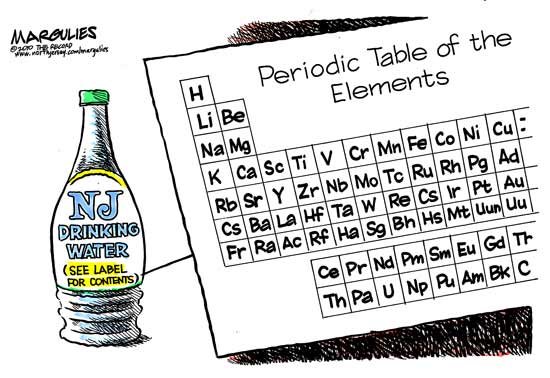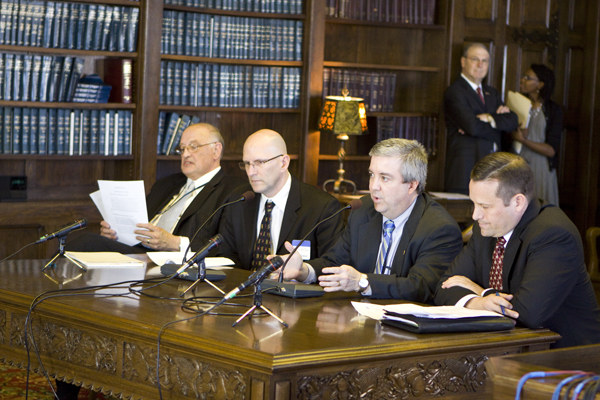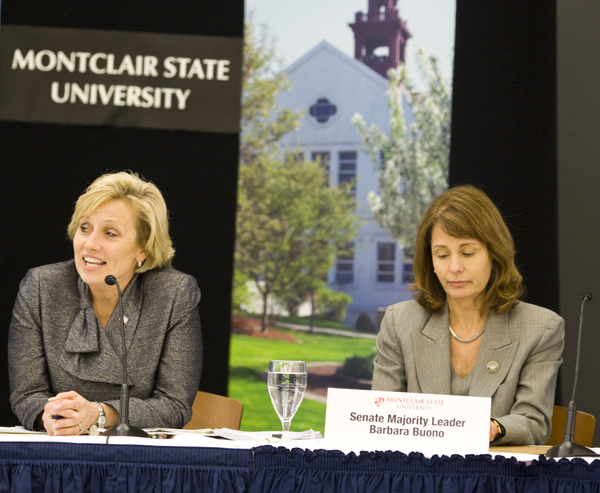Senate Majority Leader Buono Calls Legislation “Assault on Decades of Environmental Protections”
So Why Are Her Colleagues Rolling Over To Enact Governor Christie’s Agenda?

DEP studies have found over 500 unregulated chemicals polluting NJ drinking water – but instead of requiring treatment to remove them now, Gov. Christie’s DEP wants to wait decades until federal EPA develops national standards.
Democratic legislators jumped on board the Christie Administration’s “Red Tape” environmental rollback wagon yesterday, as 3 more horrible bills were released by legislative committees.
Christie and his corporate backers are shamefully using the economic recession as a pretext to attack and rollback environmental and public health protections, under the guise of slogans: “common sense regulatory principles” and “streamlining red tape”.
(DEP permits need to be “streamlined” to create jobs? Thousands of projects with DEP approved permits are stalled, which was the logic of the Permit Extension Act – but facts and logic dont matter).
Perhaps worse, corporate Democratic leaders seem intent on outspinning the Governor, cynically calling the rollback bills part of a “back to work” package.
But in fact, no credible economist – none -Â links the recession to environmental protections. No one argues that rollbacks will create jobs.
Just the opposite is true:
- the recession and unemployment were caused by the bursting of an unregulated Wall Street greed driven speculative bubble;
- environmental compliance costs are grossly exagerated by industry;
- protections have huge public health benefits; and
- environmental protections create jobs and don’t force relocations of industry.
According to the White House Office of Management and Budget (OMB) thirteenth annual Report to Congress on the benefits and costs of federal regulations:
“The estimated annual benefits of major Federal regulations reviewed by OMB from October 1, 1999, to September 30, 2009, for which agencies estimated and monetized both benefits and costs, are in the aggregate between $128 billion and $616 billion, while the estimated annual costs are in the aggregate between $43 billion and $55 billion.”
Revealing the true policy intent hidden by the “common sense” slogan, Christie’s own Executive Order #2 explicitly calls for “immediate regulatory relief”.
But somehow the media (and some environmental groups) still seem incapable of reporting these facts which contradict and expose the Governor’s spin.
The bills released yesterday were based on Lt. Governor Guadagnos’ business dominated Red Tape Review Group Report. That Report attacked DEP and targeted 12 specific DEP regulations for rollback (see Appendix H).
The Red Tape Report also called for major changes to the way regulations are developed in order to promote business interests. Changes would allow industry to derail, weaken and delay regulations, and increase political control over the content of regulations.
Again, the Christie Administration’s objective to rollback environmental regulation is clear. The objectives of the Red Tape Report are:
“employing a cost/benefit analysis on rules, justifying exceeding federal standards and refraining from doing so unless a New Jersey-specific policy goal is being pursued, …. working to lessen burdens and compliance costs to businesses.” ( page 33)
The controversial Red Tape bills re-emerged yesterday in obscure hearings before the Senate Budget and Appropriations Committee, and just days before Christmas after languishing for more than 8 months.
When the original package of bills were heard in the Assembly back in March, we wrote:
Less than 48 hours after the first “public” (by invite only) meeting of the “Red Tape Review Group” (for press coverage of that meeting, see NJ red-tape review board gets an earful, led by the new Regulatory Czar established by Governor Christie’s Executive Orders #1 (imposing a moratorium on certain regualtions) and EO#2 ( establishing “common sense” regulatory policies including cost benefit analysis and rollback to federal minimums) and EO #3 ( creating the Red Tape Review Group) today an Assembly Regulatory Oversight Committee rammed through a dangerous bill to gut enforcement of a broad array of DEP public health and environmental protections.
When the second round of bills was heard in Assemblyman Burzichelli’s Committee, later in March,we warned about the sinister influence of “murderers row”:

Murderers Row: (L-R) Hal Bozarth (Chemistry Council); Lobbyist (Farm Bureau); Michael Engenton (Chamber of Commerce); & Dave Brogan (NJ Business and Industry Assc.). Jim Benton NJ Petroleum Council (rear) looks on from the shadows.
Senate Majority Leader Barbara Buono (D-Middlesex) has been a leader in resisting the Christie rollbacks and defending environmental and public health protections.
So let’s consider how the Red Tape debate emerged.
During testimony at public hearings back in March , the Red Tape initiative came under harsh criticism. Later in April, when Senator Buono refused to support the report, we wrote:
…while Senator Buono sat on the so called “bi-partisan” Red Tape Review Group, she recently strongly distanced herself from the Report’s recommendations.
According to the April 19 Star Ledger:
“The [Red Tape] report, released shortly before 11 a.m., says the group had “arrived at a series of unanimous recommendations” but omits Buono’s name from the cover sheet.
Asked about the omission, Buono said she raised concerns after receiving the language of proposed legislation last week but was told the group wanted to present a united report. as “just unanimity at any cost, even if it means being dishonest” she said. “Bipartisanship is very different than strong-arming consensus.”

Senator Buono, Senate Majority leader (R) and Lt. Gov Guadagno at Red Tape hearing in Montclair
Fast forwarding to events in Trenton yesterday, it was obvious that the deal was in – industry lobbyists and Christie Administration officials didn’t even have to testify. The Democrats did their work for them.
So here’s what the latest round of bills would do:
S 2013 – would extend the current 5 year sunset rule expiration period to 7 years.
A bad idea. Would any business in a rapidly changing science and technology environment lock itself into a 7 year cycle for innovation? The 5 year expiration is the only thing that forces state agencies to review and improve their rules.
S 2014 – undermines the integrity of current rulemaking process and invites abuse by special interests.
Current law prohibits State agencies from making what are called “substantive changes” between the proposal of a rule for public comment, and the later final adoption of that rule. This prohibition was established by NJ courts, and it is intended to protect due process rights and assure that the public is given a clear notice and a chance to comment on regulations. It also provides incentives to DEP scientists to carefully draft rules, allows DEP scientists to control the substance of rules, and shields them from political pressures.
In contrast, the bill would change 30 years of practice and would allow DEP to engage in “bait and switch”. It would create even more political pressure DEP scientists to conduct wholesale negotiations on the substance of rules.
This would make rulemaking more like the corrupt legislative sausage mill, and a lot less like a science and law based system with integrity operating in the public interest.
Here’s how it would work in 3 simple steps: 1) DEP proposes a strong science based rule; 2) political appointees at DEP allow industry lobbyists to rewrite it; and 3) DEP then adopts the industry rewrite as a final rule. By the time environmental groups and the public later figure it out, the policy decision is a fait accompli.
S 6 – (identical to S 1914 and A 2853) – This bill flat out violates federal law and would make radical changes to current environmental laws:
- creates a private compliance certification process, a gross conflict of interest;
- creates a new cost benefit test, with no safeguards, thereby subverting public health and environmetal protection standards in all laws;
- consolidates unaccountable power in a “permit czar” in the Lt. Governor’s Office
- creates waivers of strict compliance based on vague “hardship”
- codifies Governor Christie’s sham new undefined “common sense” regulatory policy (per Executive Order #2?)
We urge you to contact your legislators to oppose these bills.

Great summation of the assassination of environmental progress in NJ. It should be legally actionable that the excuses used are the economic situation, a totally irresponsible, deliberate distortion. Eliminating strong regulation will do very little, if anything, to create jobs.
Jeff Tittel and Dave Pringle also had some choice comments about SB 2014 :
http://www.politickernj.com/43612/budget-committee-passes-another-deregulatory-bill-gives-green-advocates-fits
@zimmerman
Yes, and so did Rick Engler of Work Environment Council.
Rick and I worked with Senator Buono to get amendments to the Assembly version of S9, before Pringle and Tittel arrived at the hearing.
S9 was held by the SBA but the Assembly version was later rleased by the Assebly Budget Cmte.
Pingback: WolfeNotes.com » A Fish Story to Illustrate Flaws with “Bait and Switch” Bill
Pingback: WolfeNotes.com » Incoming Republican House Begins Deregulation Attack – Polluters Target EPA and Global Warming
Pingback: WolfeNotes.com » Senate President Sweeney Attacks Public Health and Evironmental Protections
Pingback: WolfeNotes.com » For Whom the Parks Open
Pingback: WolfeNotes.com » “Reporting” on Lt. Gov. Guadagno’s “image” and “hurt feelings”
Pingback: WolfeNotes.com » The Beaches, Bays, and Rivers Are Yours
Pingback: WolfeNotes.com » Christie Regulatory Czar Consolidates Power
Pingback: WolfeNotes.com » Only DEP “Red Tape” Prevented an Oily Black Delaware River
Pingback: WolfeNotes.com » Legislative Veto of DEP Waiver Rule May Be More About Politics Than Policy
Pingback: WolfeNotes.com » EPA Science Advisory Board Criticizes EPA Fracking Finding On “No Widespread Impacts”
Pingback: WolfeNotes.com » Is The Legislature’s Attempt to Dedicate Natural Resource Damage Funds A Trojan Horse?